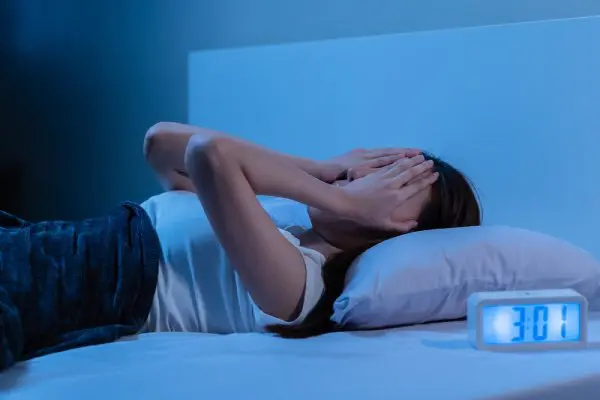
Insomnia and anxiety are two common health problems that many people face. Although separate issues are often closely linked, making situations worse in a never-ending cycle. If you suffer from anxiety, you may find it harder to sleep, and if you have insomnia, your anxiety may get worse. However, understanding the connection between these two conditions is crucial to breaking the cycle and finding relief.
In this blog, we will explore the connection between them, how they affect each other, how they are linked, and much more.
Understanding Insomnia and Anxiety
Anxiety and Insomnia are two common but distinct types of conditions that often occur together. People who experience insomnia feel higher anxiety, whereas people who have anxiety usually lack sleep. Insomnia is when you have trouble falling asleep, staying asleep, or waking up too early and unable to go back to sleep. It can make you feel tired, moody, and unable to focus during the day. Anxiety, on the other hand, is a feeling of intense worry, fear, or nervousness, which manifests physically and mentally.
Both insomnia and anxiety can make daily life harder to manage. When they happen together, they can create a complicated situation where one condition worsens the other. Moreover, the emotional and mental strain from anxiety disrupts sleep patterns, while the lack of restful sleep worsens anxiety, making it harder for individuals to cope with stress. Anxiety disrupts sleep, and lack of sleep makes anxiety worse, making it even harder to manage.
The Cycle between Insomnia and Anxiety
The relationship between insomnia and anxiety can become a cycle: anxiety leads to insomnia, and insomnia makes anxiety worse. This ongoing struggle affects both your physical and mental health.
Anxiety leads to Insomnia
Anxiety is a mental state in which you face excessive worry, fear, or nervousness about potential future events or situations. This state of alertness and stress significantly interferes with sleep. The mind becomes consumed by racing thoughts, making it nearly impossible to quiet the mental state and wind down at night. As anxiety leads to poor sleep quality or complete sleep, it contributes to a cycle of promoted emotional distress, making it even more challenging to manage the original feelings of anxiety.
Anxiety induced Insomnia
When insomnia is caused due to anxiety, it becomes a specific type of sleep disorder known as anxiety-induced insomnia. This condition refers to the inability to fall or stay asleep due to the constant presence of anxious thoughts and feelings. The brain becomes alert and focuses on potential stressors, dangers, or worries, making it difficult to relax. Additionally, chronic anxiety is the root cause of this insomnia. However, it also creates a pattern of disturbed sleep that feeds into anxiety, making it even harder to manage emotions or face the day ahead.
Insomnia Worsens Anxiety
Insomnia does not simply result from anxiety; it can also worsen anxiety in a disturbed cycle. When people do not get enough sleep, they may feel more irritable, stressed, and emotionally unstable, which heightens anxiety levels. Moreover, the frustration of not having sleep enhances anxiety itself. Therefore, if you have chronic insomnia, it also leads to other physical health problems, including weakened immune function, increased sensitivity to pain, and higher vulnerability to mental health conditions such as depression, further complicating the anxiety disorder.
The Relationship between Insomnia and Anxiety
The relationship between insomnia and anxiety is quite difficult to analyze. Anxiety often leads to physiological changes that make sleep more disturbed and difficult to catch. These changes include increased stress and hormone cortisol levels, heart rate, and muscular tension.
Conversely, insomnia directly affects a person’s emotional well-being, so sleep is essential for emotional, mental, and stress management. Furthermore, these two conditions create a difficult relationship as insomnia worsens anxiety, and anxiety makes it harder to sleep.
How do you know you have Insomnia?
Insomnia has several signs and symptoms, such as:
- Difficulty falling asleep, such that it takes longer than 30 minutes to fall asleep regularly, even if you’re tired.
- It makes you stay up during the night. Moreover, it also causes frequent waking up and difficulty returning to sleep.
- Waking up earlier than desired and being unable to get back to sleep.
- Even if you manage to sleep for several hours, you still feel fatigued and unrested in the morning. Which means you have a non-restorative sleep pattern.
- You also experience daytime fatigue, which can result in excessive tiredness or trouble concentrating and functioning throughout the day, which may be due to a lack of quality sleep.
How to treat insomnia due to anxiety
Treating insomnia caused by anxiety requires multiple approaches that address both the sleep disorder and the underlying anxiety. Here are several strategies:
- Cognitive Behavioral Therapy for Insomnia CBT-I is an evidence-based treatment that helps individuals change unhealthy sleep behaviors and thought patterns that may be contributing to insomnia.
- Relaxation Techniques such as deep breathing exercises, progressive muscle relaxation, or guided imagery can help lower anxiety levels and relax the body, making sleeping easier.
- In some cases, doctors may prescribe medications for both anxiety and insomnia. Sleep aids like melatonin or sedatives also help in the short term.
- Establishing a consistent sleep routine, limiting caffeine and alcohol, and creating a calm and dark sleep environment also improves the quantity and quality of sleep.
Lifestyle Changes
Making certain lifestyle changes helps manage both insomnia and anxiety. These changes not only support better sleep but also reduce anxiety levels. Here are some suggestions:
- Exercise regularly to reduce anxiety and improve sleep. However, it’s best to avoid vigorous exercise close to bedtime.
- Maintaining a consistent sleep schedule before going to bed and waking up at the same time every day helps regulate the body’s internal clock, improving sleep quality.
- Limit Stimulants also avoid caffeine, nicotine, and alcohol in the hours leading up to bedtime, as they interfere with sleep and increase anxiety.
- Create a relaxing bedtime routine, prefer calming activities like reading, listening to soothing music, or taking a warm bath to signal to your body that it’s time to wind down.
- Avoid casual napping, while naps are beneficial but excessive napping during the day, especially in the afternoon, disrupts your sleep cycle and worsens insomnia.
- Practice stress-reduction techniques like journaling, talking to a therapist, or engaging in hobbies that bring joy and relaxation.
Take Away
Insomnia and anxiety are deeply connected, creating an unbreakable cycle. However, it is essential to understand the relationship between these two conditions and take proactive steps. These steps include seeking professional help and making lifestyle changes. Moreover, practicing relaxation techniques also improves your sleep and mental well-being.
At Home Sleep Center, we provide sustainable solutions that help break the cycle with the right support and effort. Don’t struggle in silence; seek the help of healthcare professionals and lead towards lasting solutions.

